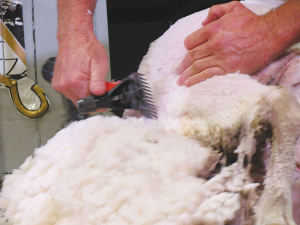Earlier this month, O’Connor released the Wool Industry Project Action Group’s (PAG) report – Vision and Action for NZ’s Wool Sector – that will supposedly help the “strong wool sector grow and thrive”.
One of the group’s key recommendations is the appointment of an executive officer supported by wool sector experts and government agencies, supporting skills training, research and development, sector data and connection and coordination. It also wants to see stronger governance to oversee development of an investment case.
Strong wool prices have slumped 40% since the 1990s. Latest auction results for full fleece make grim reading. Good quality cross-bred, greasy wool is managing just $1.50/kilogram, which rises to $1.90/kg for “really good” clean wool – a price drop of between 35 - 40 % over the past quarter alone.
Former Federated Farmers meat and wool chair Miles Anderson doesn’t hold a lot of hope for relief in the much-anticipated release of the Government’s report.
“I think it will probably be something people will argue over what is right and what is wrong and, at the end of the day, industry will need to take any good and work collectively from a key starting point.”
National Council of New Zealand Wool Interests chairman Craig Smith says the big thing missing from the wool working group’s report is an action plan to deliver the recommendations.
“We can’t be sitting around waiting for more reports to be written. We need to get on and get stuff done,” Smith says.
Even Labour’s own coalition partner New Zealand First is calling for more substantive actions following the release of the report.
“Conceptually, it is a step in the right direction, but a concrete plan is needed to boost this industry which is in a dire state,” the party’s primary industries Mark Patterson says.
He has floated a ‘Fonterra of Wool’ concept as an alternative model and claims it should be seriously considered for the wool industry.
“A successful co-operative for New Zealand wool similar to that of our dairy industry could reap great rewards for our wool farmers,” Patterson claims.
He says more radical solutions are needed to ensure New Zealand wool is profitable.
The PAG, chaired by John Rodwell, admits that increased competition from synthetic fibres has reduced demand for strong wool. It adds that attempts to respond to this threat and revitalise the strong wool sector have failed in the past.
“However, we believe we are on the cusp of a natural fibre renaissance, led by more environmentally and socially conscious consumers, and that a new approach is needed. The wool sector has a significant opportunity to leverage New Zealand’s unique farming systems and the natural and sustainable qualities of wool to further expand markets by targeting discerning consumers who value these attributes.”
The PAG recommends “identifying opportunities” for players in the strong wool sector to “invest and work together to target high-value consumers and end users”.
Rodwell believes any strategy must put the consumer at the centre, rather than relying on commodity prices and NZ’s heavy dependence on the Chinese market.
O’Connor concedes that the new strategy will not be a silver bullet for the wool industry’s current woes.
“There’s no single idea or government policy to solve the wool sector’s problems. Our challenge now is to bring the people who are really going to shift the dial together and connect them with the support they need to succeed.”
MPI has been charged with working with the wool sector to progress the next steps.
The report
The PAG report sets out three key recommendations:
• Develop a market-focused investment case and strategic roadmap for the strong wool sector.
• Establish the capability necessary to get the sector match fit and ready for the opportunities ahead.
• Establish a governance and coordination capability.



















